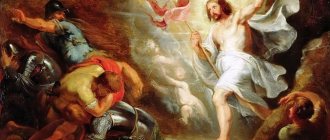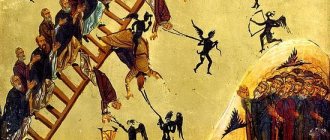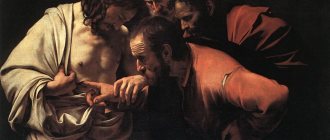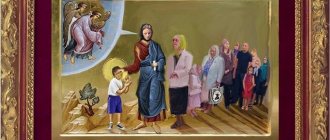Home page » Phraseologisms » The meaning of the phraseological unit “Doubting Thomas”
Author: Maria Znobishcheva
Philologist, candidate of philological sciences, poet, member of the Union of Writers of Russia. Publication date:09/24/2021
It is difficult to explain to a foreigner who Thomas is. There is some deep secret in this Russian name, an internal prehistory that has left an imprint on it either of simplicity or of some kind of inferiority. The clue is hidden in the word “unbeliever.” Let's talk about him.
Expression value
Unbeliever Thomas is a person who is persistent in denying the obvious. Even if everyone confirms the truth of what happened, he persists in his disagreement. It is difficult, and sometimes impossible, for such a Thomas to prove anything.
This nickname can be given to a lonely man, accustomed to the blows of fate, at the hour when he refuses to take back his wife who once deceived him and is now repentant.
"I do not believe! I do not believe!" - he will repeat, thinking that such returns cannot have a disinterested purpose. No matter how sincere the feelings of the returning spouse, a heart blinded by pain will no longer be able to believe in a miracle.
A non-believer Thomas is an employee who strongly doubts his salary increase. Colleagues have long ago decided what they will spend the promised money on, but the skeptic still advises them to roll their lips.
As a rule, such strong unbelief, which is similar to a kind of faith, does not come from a good life. And what about the first one, Thomas?
Why can every person be compared to the unbelieving Thomas?
Photo: Azbyka.ru
Thus, we were able to discover that the expression “distrustful Thomas” comes precisely from the Gospel passage about the appearance of the Lord after the resurrection, when one of the disciples was not there. Although Thomas was told about this event, he did not have enough faith, but the Lord himself strengthened it by demonstrating to him his resurrection. This often happens in the life of a modern person, because we do not believe in the Lord, but we believe in what the world tells us. A person is inclined to believe only in what he has seen with his own eyes, touched and felt, but he does not always believe in the existence of the Lord and in His grace.
Without believing in God, a person often seeks happiness in earthly affairs, tries to create and invent something, but this does not bring pleasure. If we compare the joy of earthly things and the joy of Easter, the unforgettable atmosphere that fills all churches, then, without a doubt, it is worth saying that true joy can be achieved through trust in the Lord, through faith in Him, and without him there is no point in this life. We, like Thomas, when we fully believe in God, can receive true joy, find and fulfill our purpose on earth, living our lives with dignity.
The example of Thomas shows everyone that faith in God and union with Him bring real joy to a person, and material things that can be seen and touched are only auxiliary substances that help the body survive, but in no way satisfy the needs of a person’s soul. Every person should think about the fact that, remaining an unbelieving Thomas, it is impossible to understand true happiness and joy, but by believing in the Lord and trusting in Him, you can find eternal treasures for your soul. Remembering the unbelieving Thomas, every Christian should once again deeply think about whether he completely trusts the Lord and if the answer to the question is negative, then it is worth correcting the situation as soon as possible in order to become truly happy.
Origin of phraseology
Church tradition calls one of the apostles Thomas the Unbeliever (infidel), who, having heard the news of the other disciples about the Resurrection of the Teacher, did not believe it. The Gospel conveys his words as follows:
Unless I see in His hands the marks of the nails, and put my finger into the marks of the nails, and put my hand into His side, I will not believe (John 20:25).
Having learned about Thomas’s unbelief and guessing what torment it was for him, Jesus allows the disciple to touch Him so that he will find the happiness of faith. This image allegorically tells about the fate of all humanity, which has trusted too much in the world of the visible and tangible. We find it difficult to take anything for granted.
We are accustomed to trusting scientific knowledge, and it, in turn, appeals to facts, figures, and objects. Having forever forgotten how to believe like children, “just like that,” without evidence, we are tormented by doubts, like the Apostle Thomas, who is remembered on the first Sunday after Easter, as if trying to remind the world that the joy of the holiday concerns everyone: and those who believe , and those who doubt.
Phraseologism has firmly entered our everyday life because there are more doubters than believers. There is too much pain in the world, which means more wounded hearts. But sometimes there is more truth in such denial, more spiritual thirst, which is in false humility and external goodness.
Imperfect Apostles
The gospel narrative does not at all resemble a smooth text with ideal heroes. Only Christ appears ideal before us, but his disciples at the beginning of his ministry are still so far from perfect... In a sense, it was not for nothing that the Pharisees and scribes reproached Jesus for eating and drinking with tax collectors and sinners (Matthew 9:11).
The Gospel does not hide from us the fact that Judas Iscariot betrayed the Savior. Does not justify Peter, who denied the Teacher three times. But, according to Tradition, Peter mourned his sin until the end of his life. There were even furrows on his face from the flow of tears.
The apostles, unenlightened by the Holy Spirit, even argued which of them would sit on the right and left hand of the Savior in the Kingdom of Heaven.
But first in the popular “rating” of apostolic mistakes, besides Judas Iscariot (he is generally “out of competition”), is usually placed the so-called Unbeliever Thomas. The name of this apostle even became a household name. And it is not used in a theological and especially not in a positive context.
But was the Apostle Thomas as he is portrayed? Why does Christ respond with such love to his unbelief? How did this disciple of Christ end his life and why did the Church canonize him?
Synonyms
The expression “Doubting Thomas” has several very ordinary synonyms that in everyday life characterize proud and stupid stubborn people. Here are some of them:
- at least a goal on your head;
- what you don’t see, you don’t believe;
- trust but check;
- Until the thunder strikes, the man will not cross himself.
Well, everyone has the right to their own religious experience. Proverbs born from one or another people are the result of life lessons. Sometimes everyday things come to the fore in them, but the language is given to us to truthfully reflect both poles of the people's faith.
Who became the 12th apostle after Judas?
After Judas fell away, Matthias was chosen as one of the twelve apostles (Acts 11:23–26). According to Christian teaching, during his life Jesus Christ called twelve disciples to be with him, proclaim the Gospel and cast out demons (Mark 3:14) and speak on his behalf (Mark 3:14).
Interesting materials:
How to transfer files to a Samsung memory card? How to transfer files to a memory card? How to transfer files via bluetooth? How to move files to SD card? How to move files from folder to folder? How to move files to a flash drive? How to move files to Android memory card? How to move files to a memory card? How to move files to the card? How to move files to Xiaomi SD card?
Other phraseological units
To make mountains out of molehills
Greatly exaggerate, exaggerate, worry too much about minor reasons.
Disservice
Help that ended up causing harm rather than benefit.
The bear stepped on my ear
A person who has no ability for music or is deaf.
Write it's gone
It means an extreme degree of despair, the conviction that the matter cannot be improved.
All phraseological units
A book from the authors of this article!
Collection: “100 popular phraseological units of the Russian language”
More details
Who was Thomas and what was his story?
Photo: Pravoslavnaya-biblioteka.ru
After carefully reading the Gospel, you can understand that Thomas is one of the closest disciples of Jesus Christ. Before the Savior called Thomas, he was an ordinary fisherman, but he left this business and followed Christ. At first this disciple was named Judas, but then he became Thomas, which means “twin.” Thomas was nicknamed so because of his external resemblance to the Savior, but this is only a hypothesis, not a confirmed fact. Thomas was not among the disciples when Christ appeared to them after the resurrection, and he did not believe the words of others, so they called him an unbeliever.
Evangelical Reformed Church
doubting Thomas
Thomas's disbelief and fear of the students left without a Teacher.
Only the Holy Spirit can fill the heart with knowledge of truth, joy and boldness. Blessed are those to whom the Lord gives faith. The topic of our discussion today is “Doubting Thomas.” The story about the Apostle Thomas is recorded in the Gospel of John, in the 20th chapter. It tells how on the first day of the week the Lord Jesus Christ rose from the dead, and on the evening of this Sunday appeared to His disciples, and we say that our Lord, our Savior, is the firstborn from the dead. And this is a great hope for us, for we believe that we will also be resurrected.
Sometimes they ask, if He is the firstborn, then what can we say about Lazarus, the daughter of Jairus and others? They were indeed resurrected by the Lord, but their resurrection was fundamentally different from the resurrection of the Lord in that they were resurrected in their bodies. The Lord rose in a perfected, glorified body, and we will have such bodies.
So, the disciples are sitting behind doors locked from fear of the Jews, and suddenly the Lord Jesus Christ stands in the middle of them, stands in a new body that can move in space. When the disciples saw Jesus, they were even more afraid and thought that it was the spirit of Jesus. He said to them: “Look at My hands and My feet; it is I Myself; touch Me and look at Me; for a spirit does not have flesh and bones, as you see I have.” (Luke 24:39). Another miracle was when He appeared to the disciples on the road to Emmaus. But they did not recognize Him right away, and only later, when their hearts were pounding, did they realize that the Lord was talking to them.
Fear is actually not a bad feeling. When we experience fear, we begin to look for support to reduce fear. Some people find true support in the Lord Jesus Christ, others find false support when they rely on their own strength or on something else. “Peace be with you,” the Lord says to the disciples, and this can be considered as a Jewish greeting, these words are written in the New Testament in Greek, but it is the same as “shalom aleichem.” Jesus repeats this twice. And this is not just a greeting, this is a desire to reassure. In Russian, the word “mir” has many meanings, it means space, and society outside the church, and the opposite of war, and also “peace” - peace of mind. He invites us to not worry, to have peace, because everything is under His control, the Holy Spirit is in control of everything. “Do not be afraid, I am with you to the end of the age.” The disciples were delighted and immediately offered Christ baked fish and honey, and He ate with them. Thomas was not with them, he came later, and they told him about Jesus. But Thomas doesn’t believe it.
So, is the expression “Doubting Thomas” an accusation or a statement of fact? We cannot and cannot blame Thomas. Why can't we? Because a person cannot believe on his own, even ten, even twenty people will say that the Lord Jesus is God and Savior, that in order to be saved you just need to accept Him into your heart with faith, everything is useless, because a person is not able to believe on his own for the reason original sin. But in any case, the responsibility for unbelief lies with the person, for the call to repentance sounds, but he refuses, he does not want to. God is not to blame.
And Thomas is a wonderful example of how faith is born; it was not flesh and blood that revealed the truth to him, but the Holy Spirit. And in this chapter there is a wonderful phrase of the Apostle John, “Having said this, he breathed and said: “Receive the Holy Spirit.” This phrase confuses many, because what then is the feast of the Trinity, which will take place 49 days after the resurrection of the Lord Jesus Christ? Here John writes that they received the Holy Spirit, and Luke says that this happened only on Trinity or Pentecost?
In fact, the Holy Spirit descended on the day of Pentecost and began to work powerfully. Here in John it is only an image. An image of the Spirit breathing where it wants. When Thomas met Jesus on the eighth day, we remember that the disciples were again sitting behind locked doors.
But what happened to them when they received the Holy Spirit on the day of Pentecost? They openly began to preach the Gospel, and Peter loudly and openly, without fear, preaches to the Jews and says that “with wicked hands you killed Him, nailing Him to the cross.” As a result, people begin to repent, because they understand that this was truly the Son of God, and they crucified Him.
Spirit, breath, in the Gospel of John these words are interchangeable, and we ourselves must guess what we are talking about, and since we read the word Holy, we understand that we are talking about the Spirit.
What happens to Thomas? Jesus offers to put his fingers into Jesus' wounds. Thomas exclaims in response: “My Lord and my God.” That is, Master, my master. Everything in him turned upside down, and he realized that from now on he would serve the Lord. Jesus says to him: You believed because you saw Me; Blessed are those who have not seen and yet have believed.” Is this an accusation against Thomas? I think not. Millions of believers have not seen it, but they are blessed.
People often associate the word “blessed” with the word “crazy,” but these words are different, having different etymologies. It should be noted that due to its laziness, humanity strives for the state of Ellochka the Ogress, for whom thirty words were enough to express any of her thoughts. Pushkin, for example, had a vocabulary of 21,330 words, not counting proper names, geographical names and foreign words that he used. Today people sometimes make do with 10-12 words to express their thoughts, the most decent of which is “tin”.
In the Russian language dictionary, the word “Blessed” means “happy to the highest degree.” But writing this expression takes a long time and is inconvenient to speak. Therefore, when the word “blessed” is replaced with the word “happy” during translation, the meaning is stolen. How can those who have not seen believe? The Word of God is living and active, under the Action of the Holy Spirit it penetrates our soul like breath. The word of Jesus breathes in us, and those words that seemed stupid to us, the foolishness of the sermon, save people. This happens in the most amazing way, because the Holy Spirit acts on earth and continues His work to this day.
You can talk about Christ to a person many times, but unless the Holy Spirit intervenes, nothing will change. Therefore, we are immensely grateful to the Lord for the resurrection of Jesus Christ and for the fact that the Holy Spirit applied this historical truth to our hearts and minds, otherwise everything would be limited simply by traditions, which often prevent us from seeing the truth. And I thank the Lord that through His Word He reveals the truth to us, and we can listen to Him. We are grateful to the Lord for the work of the Holy Spirit. Glory to our great God the Father, Son and Holy Spirit. Amen!
Date: April 15, 2022 Topics:
Bible: John
What is the name of the place where Christ was crucified?
According to tradition, at the beginning of the 1st century, Golgotha was located outside the city walls of Jerusalem, to the northwest of the city. It is currently part of the Church of the Holy Sepulcher in the Christian quarter of the old city of Jerusalem.
Interesting materials:
How to transplant a ficus from a cutting? How to replant phlox in spring? How to replant horse chestnut? How to recalculate a working pension? How is the pension recalculated after dismissal? How to retake 2 personal income taxes? How to send a large amount of information? How to send a postcard on WhatsApp? How to stop being shy to talk to people? How to reinstall Nvidia Control Panel?









